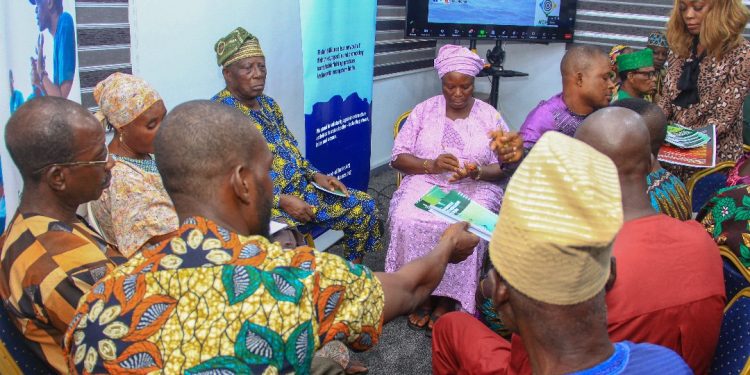Fisherfolks in Awoye, Ondo State have lamented the continuous burning of Ororo Well for over three years without attention from the government, which has led to the loss of livelihoods and displacement of many residents of the waterfront community.
The fisherfolks shared their grief during a video documentary screening of the Ororo Well fire and media briefing organized by the Health of Mother Earth Foundation (HOMEF) in Lagos.
Residents of Awoye in Ondo State and residents of Makoko, a waterfront community in Lagos, shared how they have suffered over time because the government does not take cognizance of their plight.
Speaking about the negative impacts of the Ororo Well fire which was caused by oil spillage, Mr. Temilorun Ajimisugbe explained that it has been difficult to fish on the water because of the fire, and most times, fishermen have to travel long distances before they could manage to get few fishes.
Ajimisugbe explained how horrible it has been for individuals in the community to survive as they depend largely on fishing.
“We can no longer fish because there is fire burning on the water. It has been difficult for us to survive, and there is nobody that we can turn to for help,” he added.
He thereafter appealed to HOMEF to continue to engage with the government and relevant stakeholders to ensure that the necessary thing is done to ensure that normalcy is restored in Awoye.
Buttressing Ajimisugbe’s comments, Mrs. Taiwo Ilabiri explained that women who pick periwinkle can no longer pick and sell, adding that poverty is ravaging the Awoye community.
She appealed to the government to address the plight of women and intervene before the situation gets worse than it is.
Earlier, Dr. Nnimmo Bassey, the Executive Director of HOMEF, said it was pathetic that neither the state government, the federal government nor the oil company involved, is saying anything about the Awoye issue with people barely surviving in the community.
Dr Bassey explained that “the fire is not just an eyesore in the ocean, it is not just killing the fishes and killing the aquatic ecosystem, it is also magnifying the problems of global warming because millions of tons of greenhouse gases are being released from that inferno into the atmosphere.
“The more climate change is promoted by incidence like that the more you’re having higher ocean temperatures, higher salinity of the ocean and some problems like sea level rise and more coastal erosion will occur.
“The fire is more than just a fire, it is eating the land of the people, eating their houses, eating infrastructure, creating complex environmental problems and health issues for not just Awoye community and not for Nigerians living on the coastal line only it is a global emergency and we can’t afford to keep quiet about it.”
He remarked that “we cannot ignore that kind of disaster in plain sight.”
Mr. Akinbode Oluwafemi, the Executive Director of Corporate Accountability and Public Participation Africa (CAPPA) explained that when there is oil spill, there are fundamental questions that should be answered, including “what caused it, who is responsible, who bears the brunt and then who bears the liability.
“Ororo well has been spilling for quite a while, we don’t need to know who caused it. The biggest question is why punish the community residents?
“The companies that are causing these problems should bear the infractions and it is important that government agencies hold the companies accountable in the interest of the community members that are affected,” he added.
The documentary was screened, with community members sharing their plight and calling on the government’s urgent intervention.

